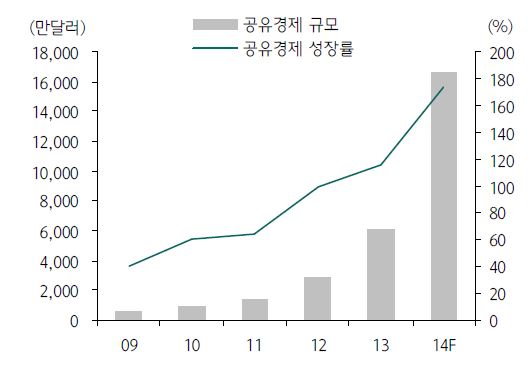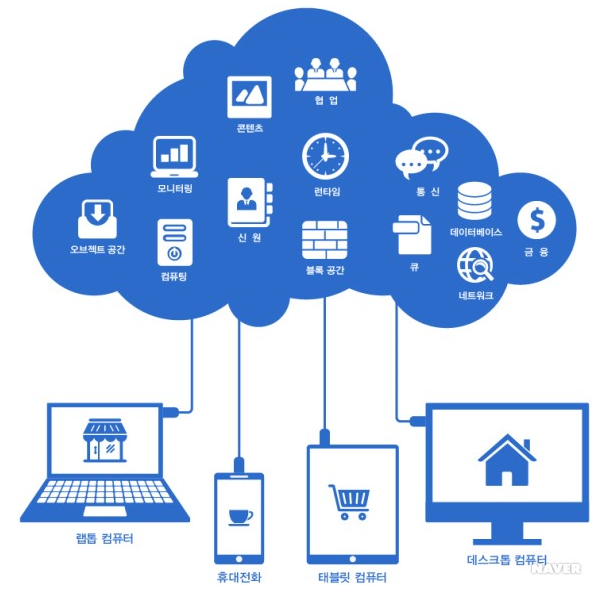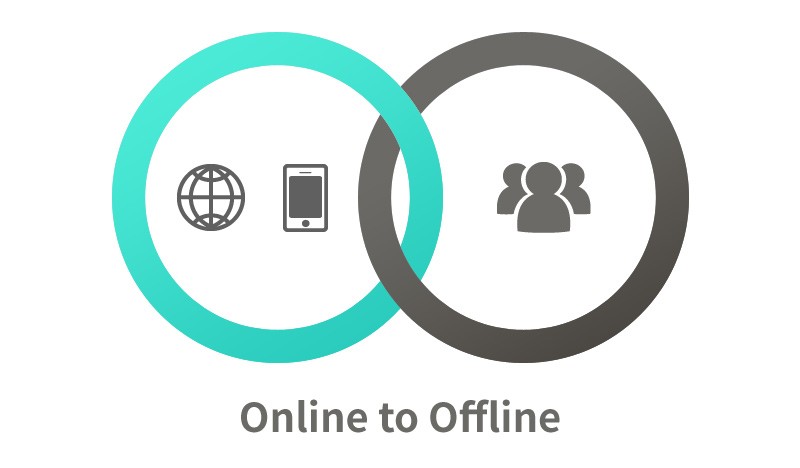List
Story > NEWS > Detail
[News] Shared Economy and National Strategy
With the advent of Uber and Airbnb, 70 percent of the top 20 unicorn companies or companies in the top 20 of the global market are now shared platform companies. Shared economy is essentially a shared platform economy because a shared economy is a structure in which transactions are made through a given platform. Community-sharing activities or co-operatives that are centered offline in the first and second industrial revolutions are also platform-based shared economies This can be seen in the form of an early shared economy, but its size and effectiveness have been minimal. However, with the development of the wired and wireless Internet of the third industrial revolution, the shared platform economy emerged in earnest as the shared economy expanded on the basis of online platforms. According to statistics released by the Korea Internet & Security Agency and KT's Institute for Economic Management, the offline economy was estimated at 930 trillion won as of 2014, while the online economy was estimated at 54 trillion won, or 5 percent, compared to offline ones.

In 2015, the Ministry of Strategy and Finance first incorporated a shared economy into the system in its 2016 economic policy direction, attempting policies to spread the shared economy. In particular, the government will come up with standards for operating paid carpool services and ways to coexist among taxi and carpool industries to innovate service services based on new technologies such as ICT. However, at a time when there is a lack of fundamental understanding of the shared platform economy, the government's policy, which was devised, is feared to remain in individual and phenomenal ways to cope with the shared economy.
A national strategy is needed to boost a shared economy based on a shared economy integration model. However, the current administration's policy has the limit of being a follow-up policy to the current phenomenon and problems that are taking place, as it only takes individual and phenomenon approaches without understanding the nature of the shared economy. A shared economy needs an integrated perspective based on the flow from sharing information to sharing materials and relationships. Therefore, a road map for expanding the sharing of information, materials and relationships should be built on the basis of a shared economy cube model.

First, sharing information is the beginning of the spread of a shared economy and the trigger for innovation. Therefore, data opening and sharing must be enabled based on the cloud. However, the number and quantity of the government's public information is on the rise, but the level of openness is still lower than that of advanced countries, and the annual growth rate is slowing. Thus, regulatory reforms are needed to boost information sharing and establish an open-source ecosystem. First of all, the UK has set a goal of classifying data based on three levels of data: open-security-absolute security, disclosing up to 90%, and actually opening up to 94%. By benchmarking this, it is desirable for Korea to open up more than 90 percent of its public data and utilize private processing businesses for efficient utilization of its data. To build an open-source ecosystem, developers need to establish a market where they can freely participate in tens of millions of open-source projects, and activate spaces and communities where developers can share and communicate ideas with each other, such as GitHub. In addition, restrictions on the use of unidentified personal information are also obstacles to information sharing. Adequate utilization and protection of personal information can be compatible if the system is switched to place thorough responsibility for abuse instead of strengthening control over personal information and easing strict prior notice and explicit consent principles.

Second, with the advent of the fourth industrial revolution, material sharing is expanding on the basis of the O2O platform, and it is the cloud that makes this possible. There are the most fundamental issues here, where regulation of Galapagos' use of cloud and data separation policies, which require security certification even for data that must be opened on a principle basis, degrade information sharing. The "Provisions for the Promotion of Private Cloud Utilization in the Public Sector" reflect conflicts with legal intent, such as stipulating that the public sector should follow the "Privacy Protection Act" and the "Act on Promotion of Information and Communications Network Utilization and Information Protection," and regulate the disclosure of public data by providing detailed criteria for open data classification. Therefore, the public sector should be encouraged to use the cloud to create a foundation for diverse personal information utilization. Policies should be made to lower entry barriers to the cloud industry and boost the cloud market through cloud regulatory reform. In addition, due to conflicts with existing vested interests, the government has implemented defensive policies, such as the illegalization of Uber services, or pursued passive support policies. Consumer welfare should be the top goal of national policy, as the existing system of protecting offline operators could rather hamper the spread of a shared economy. In addition, multi-homing competition should be maintained to create a process ecosystem based on a sustainable platform, and offline entry barriers should be eliminated.

<Multi-Homing Example>
Third, through the Gig platform, brass-walking and Giggynomi are creating new jobs by easing the supply-demand imbalance on certain technologies and capabilities. Despite these changes, however, the definition of work still remains in office and labor, and a rigid job system undermines flexibility and connectivity. Also, there is a lack of support measures to address the polarization of competency between those who are good at work and those who are not good at it. With the absence of a safety net, an insurance system, in the process of expanding the flexibility of jobs, re-challenging can be avoided. It will be necessary to benchmark cases in advanced countries where job safety nets and re-education are prioritized in national policies. The government should set up a job safety net and re-education infrastructure so that all jobs are flexible but individual ones can be safely relocated.
With the advent of Uber and Airbnb, 70 percent of the top 20 unicorn companies or companies in the top 20 of the global market are now shared platform companies. Shared economy is essentially a shared platform economy because a shared economy is a structure in which transactions are made through a given platform. Community-sharing activities or co-operatives that are centered offline in the first and second industrial revolutions are also platform-based shared economies This can be seen in the form of an early shared economy, but its size and effectiveness have been minimal. However, with the development of the wired and wireless Internet of the third industrial revolution, the shared platform economy emerged in earnest as the shared economy expanded on the basis of online platforms. According to statistics released by the Korea Internet & Security Agency and KT's Institute for Economic Management, the offline economy was estimated at 930 trillion won as of 2014, while the online economy was estimated at 54 trillion won, or 5 percent, compared to offline ones.

In 2015, the Ministry of Strategy and Finance first incorporated a shared economy into the system in its 2016 economic policy direction, attempting policies to spread the shared economy. In particular, the government will come up with standards for operating paid carpool services and ways to coexist among taxi and carpool industries to innovate service services based on new technologies such as ICT. However, at a time when there is a lack of fundamental understanding of the shared platform economy, the government's policy, which was devised, is feared to remain in individual and phenomenal ways to cope with the shared economy.
A national strategy is needed to boost a shared economy based on a shared economy integration model. However, the current administration's policy has the limit of being a follow-up policy to the current phenomenon and problems that are taking place, as it only takes individual and phenomenon approaches without understanding the nature of the shared economy. A shared economy needs an integrated perspective based on the flow from sharing information to sharing materials and relationships. Therefore, a road map for expanding the sharing of information, materials and relationships should be built on the basis of a shared economy cube model.
First, sharing information is the beginning of the spread of a shared economy and the trigger for innovation. Therefore, data opening and sharing must be enabled based on the cloud. However, the number and quantity of the government's public information is on the rise, but the level of openness is still lower than that of advanced countries, and the annual growth rate is slowing. Thus, regulatory reforms are needed to boost information sharing and establish an open-source ecosystem. First of all, the UK has set a goal of classifying data based on three levels of data: open-security-absolute security, disclosing up to 90%, and actually opening up to 94%. By benchmarking this, it is desirable for Korea to open up more than 90 percent of its public data and utilize private processing businesses for efficient utilization of its data. To build an open-source ecosystem, developers need to establish a market where they can freely participate in tens of millions of open-source projects, and activate spaces and communities where developers can share and communicate ideas with each other, such as GitHub. In addition, restrictions on the use of unidentified personal information are also obstacles to information sharing. Adequate utilization and protection of personal information can be compatible if the system is switched to place thorough responsibility for abuse instead of strengthening control over personal information and easing strict prior notice and explicit consent principles.

Second, with the advent of the fourth industrial revolution, material sharing is expanding on the basis of the O2O platform, and it is the cloud that makes this possible. There are the most fundamental issues here, where regulation of Galapagos' use of cloud and data separation policies, which require security certification even for data that must be opened on a principle basis, degrade information sharing. The "Provisions for the Promotion of Private Cloud Utilization in the Public Sector" reflect conflicts with legal intent, such as stipulating that the public sector should follow the "Privacy Protection Act" and the "Act on Promotion of Information and Communications Network Utilization and Information Protection," and regulate the disclosure of public data by providing detailed criteria for open data classification. Therefore, the public sector should be encouraged to use the cloud to create a foundation for diverse personal information utilization. Policies should be made to lower entry barriers to the cloud industry and boost the cloud market through cloud regulatory reform. In addition, due to conflicts with existing vested interests, the government has implemented defensive policies, such as the illegalization of Uber services, or pursued passive support policies. Consumer welfare should be the top goal of national policy, as the existing system of protecting offline operators could rather hamper the spread of a shared economy. In addition, multi-homing competition should be maintained to create a process ecosystem based on a sustainable platform, and offline entry barriers should be eliminated.

<Multi-Homing Example>
Third, through the Gig platform, brass-walking and Giggynomi are creating new jobs by easing the supply-demand imbalance on certain technologies and capabilities. Despite these changes, however, the definition of work still remains in office and labor, and a rigid job system undermines flexibility and connectivity. Also, there is a lack of support measures to address the polarization of competency between those who are good at work and those who are not good at it. With the absence of a safety net, an insurance system, in the process of expanding the flexibility of jobs, re-challenging can be avoided. It will be necessary to benchmark cases in advanced countries where job safety nets and re-education are prioritized in national policies. The government should set up a job safety net and re-education infrastructure so that all jobs are flexible but individual ones can be safely relocated.



